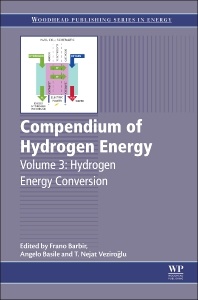Compendium of Hydrogen Energy Hydrogen Energy Conversion Woodhead Publishing Series in Energy Series
Coordonnateurs : Barbir Frano, Basile Angelo, Veziroglu T. Nejat

Compendium of Hydrogen Energy: Hydrogen Energy Conversion, Volume Three is the third part of a four volume series and focuses on the methods of converting stored hydrogen into useful energy. The other three volumes focus on hydrogen production and purification; hydrogen storage and transmission; and hydrogen use, safety, and the hydrogen economy, respectively.
Many experts believe that, in time, the hydrogen economy will replace the fossil fuel economy as the primary source of energy. Once hydrogen has been produced and stored, it can then be converted via fuel cells or internal combustion engines into useful energy.
This volume highlights how different fuel cells and hydrogen-fueled combustion engines and turbines work. The first part of the volume investigates various types of hydrogen fuel cells, including solid oxide, molten carbonate, and proton exchange membrane. The second part looks at hydrogen combustion energy, and the final section explores the use of metal hydrides in hydrogen energy conversion.
Part I: Fuel cells
1. Proton exchange membrane fuel cells
Bruno G. Pollet, Alejandro A. Franco, Su Huaneng, Huagen Liang and Sivakumar Pasupathi
2. Phosphoric acid fuel cells
Raghuathan Rengasamy, Deepa Elizabeth Eapen and S. R. Suseendiran
3. Molten carbonate fuel cells
Michel Cassir, Arturo Meléndez-Ceballos, Armelle Ringuedé and Virginie Lair
4. Solid oxide fuel cells
Massimiliano Lo Faro, Stefano Trocino, Sabrina Campagna Zignani and Antonino S. Aricò
5. Reversible fuel cells
Van Nhu Nguyen and Ludger Blum
6. Microbial and enzymatic fuel cells
Gaetano Squadrito and Pierangela Cristiani
Part II: Hydrogen combustion and metal hydride batteries
7. Hydrogen-fuelled internal combustion engines
L.M. Das
8. Blended-hydrogen-natural gas-fueled internal combustion engines and fueling infrastructure
Joel R. Anstrom and Kirk Collier
9. Optical diagnostics for the analysis of hydrogen-methane blend combustion in internal combustion engines
Silvana Di Iorio, B. M. Vaglieco and P. Sementa
10. Catalytic combustion of hydrogen for heat production
Jacques Saint-Just and Shahrokh Etemad
11. Nickel metal hydride rechargeable batteries
Kwo Young
R&D managers in industry interested in the development of hydrogen conversion technologies as well as academic researchers and postgraduate students working in the wider area of the hydrogen economy.
Angelo Basile, a Chemical Engineer with Ph.D. in Technical Physics, is author of hundreds of papers, books, chapter-books, and Special Issues in the field of Membrane Science and Technology, with also various Italian, European and worldwide patents. He is an Associate Editor of various int. journals (IJHE, APCEJ, etc), Editor-in-Chief of the Int. J. Membrane Sci. & Techn., and member of the Editorial Board of more 25 int. journals. Today Basile is working at General TAG, Via Mastri Ligornettesi n. 28, Ligornetto 6853 – Switzerland.
Dr. Veziroglu, a native of Turkey, graduated from the City and Guilds College, the Imperial College of Science and Technology, University of London, with degrees in Mechanical Engineering (A.C.G.I., B.Sc.), Advanced Studies in Engineering (D.I.C.) and Heat Transfer (Ph.D.).
In 1962 – after doing his military service in the Ordnance Section, serving in some Turkish government agencies and heading a private company
- Highlights how different fuel cells and hydrogen-fueled combustion engines and turbines work
- Features input written by leading academics in the field of sustainable energy and experts from the world of industry
- Examines various types of hydrogen fuel cells, including solid oxide, molten carbonate, and proton exchange membrane
- Presents part of a very comprehensive compendium which, across four volumes, looks at the entirety of the hydrogen energy economy
Date de parution : 09-2015
Ouvrage de 328 p.
15x22.8 cm



